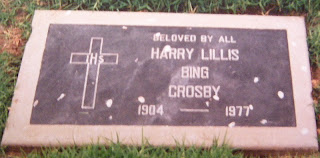One of the first multimedia stars, from 1934 to 1954 Bing Crosby was very successful across record sales, radio ratings and motion picture grosses. Crosby and his musical acts influenced male singers of the era that followed him, including Perry Como, Frank Sinatra, and Dean Martin. Yank magazine recognized Crosby as the person who had done the most for American G.I. morale during World War II and, during his peak years, around 1948, polls declared him the "most admired man alive," ahead of Jackie Robinson and Pope Pius XII. Also during 1948, the Music Digest estimated that Crosby recordings filled more than half of the 80,000 weekly hours allocated to recorded radio music.
Crosby exerted an important influence on the development of the postwar recording industry. In 1947, he invested $50,000 in the Ampex company, which developed North America's first commercial reel-to-reel tape recorder, and Crosby became the first performer to pre-record his radio shows and master his commercial recordings on magnetic tape. He gave one of the first Ampex Model 200 recorders to his friend, musician Les Paul, which led directly to Paul's invention of multitrack recording. Along with Frank Sinatra, he was one of the principal backers behind the famous United Western Recorders studio complex in Los Angeles.
Through the aegis of recording, Crosby developed the techniques of constructing his broadcast radio programs with the same directorial tools and craftsmanship (editing, retaking, rehearsal, time shifting) that occurred in a theatrical motion picture production. This feat directly led the way to applying the same techniques to creating all radio broadcast programming as well as later television programming. The quality of the recorded programs gave them commercial value for re-broadcast. This led the way to the syndicated market for all short feature media such as TV series episodes.
In 1962, Crosby was the first person to be recognized with the Grammy Global Achievement Award. He won an Academy Award for Best Actor for his role as Father Chuck O'Malley in the 1944 motion picture Going My Way. Crosby is one of the few people to have three stars on the Hollywood Walk of Fame.
Death
At the conclusion of work in England, Crosby flew alone to Spain to hunt and play golf. Shortly after 6 p.m. on October 14, Crosby died suddenly from a massive heart attack after a round of 18 holes of golf near Madrid where he and his Spanish golfing partner had just defeated their opponents. It is widely written that his last words were "That was a great game of golf, fellas." In Bob Hope's 1985 book Bob Hope's Confessions of A Hooker. My Lifelong Love affair With Golf, Hope recounts hearing Crosby had been advised by a physician in England to only play 9 holes of golf due to his heart condition.
Bing Crosby is buried at Holy Cross Cemetery in Los Angeles, California nor far from Bela Lugosi, Rita Hayworth, and Sharon Tate.































No comments:
Post a Comment